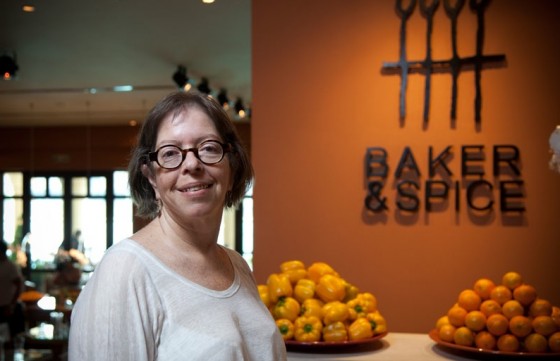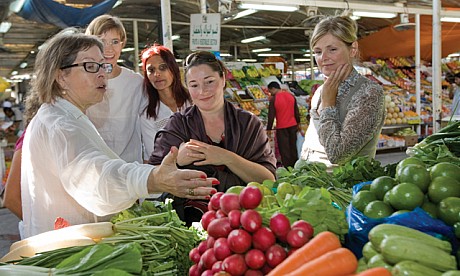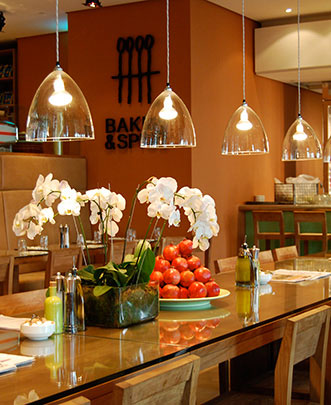 In an interview with Green Prophet, Yael Mejia describes the benefits of buying fresh food locally.
In an interview with Green Prophet, Yael Mejia describes the benefits of buying fresh food locally.
It was largely because of Yael Mejia’s efforts to provide the good people of Dubai a fresh, no-frill food experience that the region’s first Farmers Market took place.
Their Brand Consultant, Yael has been wooing local farms in the United Arab Emirates since the Dubai branch of Baker & Spice opened last January. B&S can then source as many of their ingredients locally as possible, and encourage others to do the same. Not only does fresh food taste better, according to Ms. Mejia, but food that doesn’t travel from the other side of the planet does not carry such a massive carbon load.
Yael, you opened the first Baker & Spice store in London in 1995. Can you share a brief glimpse of your background and how it influenced your initial vision?
In 1990 I started a bread distribution business in London, essentially Bread broking. I was buying from the best available at the time and selling the mix and variety to customers who could pick and choose from a vast list which did not restrict them to one bakery.
In 1993 I began baking for my business in a bakery I called the Bread Factory. It was all artisan baking.
Being a wholesale business I wanted visibility on the high street and opened B&S. The vision was dictated by the premises. We had Victorian sole ovens in the basement and a huge kitchen behind the shop and this enabled us to cook and bake what we wanted. A playground which became an iconic shop in London. Now sadly defunct.
B&S began as an artisan food shop and evolved into a “no-frills” dining experience. In what way do you think that food has become “frilly?”
In every way. Once upon a time people cooked at home and went out for “frilly” special occasions.
Now no one cooks at home and relies more and more on other businesses to supply nourishment.
There is a prevailing school of thought that says the more frills the more we will pay for our food regardless of what it is we are actually eating.
After experiencing such enormous success in London, you helped to open a Baker & Spice branch in Dubai at the Souk Al Bahar in January, 2009. How did that choice come about, and what gave you the confidence that you would be able to source the same quality ingredients that you were able to purchase in the United Kingdom?
The choice came about from the Kuwaiti owners of B&S in Dubai. They felt the Dubai market was ready for this type of food philosophy. I had no confidence what so ever and learnt my way around the markets looking tasting and listening and sometimes screaming. It took a long while to understand what was going on and where it all came from.
We must have shouted loud enough because somehow the right people heard us and we got to know some farmers and it all started rolling in the right direction.
Can you give us your definition of organic agriculture?
My definition is the UK Soil Association definition.
The National reported earlier this year that only 16 out of 40,000 farms in the UAE are organic. What does this statistic represent to you? What prohibits other farmers from picking up the organic baton?
If there are 16 I would like to know who they are. I know of one. This represents a huge opportunity.
You source much of your produce from local farms, among them Salata, Mazaraa, and Nazwa. Are there any other organic farms in the United Arab Emirates that you would like our readers to know about?
Nazwa closed down, Salata is not organic. The most important definition to me is Local not Organic.
Another good name is Dar al Fatah, then there is Meerak, and we are looking at others. When we find them we will update information on our website.
Local organic produce is less expensive than imported produce, but more expensive than local produce grown with pesticides. Why do you think your customers are prepared to pay the higher price for your food?
Because everyone is scared about the unknown and inexplicable. We are being treated like mushrooms: kept in the dark and being fed horseshit. People are getting sick, fat, and the common denominator is the food we eat which is supposed to be safe, it isn’t.
 One thing that is very important to you is changing your menu according to the seasons, the same way we might decorate our homes depending on the holidays. However, some people will still want winter squash in the summer. In your view, what has been the consequence of our estrangement from the food-growing process?
One thing that is very important to you is changing your menu according to the seasons, the same way we might decorate our homes depending on the holidays. However, some people will still want winter squash in the summer. In your view, what has been the consequence of our estrangement from the food-growing process?
You put your finger right on the button. The consequence is that food is flying around the globe to feed a need which isn’t there. It is not fresh, and has suffered from early picking so no taste. Or it was picked 6 months ago and pretends to be fresh. If you knew that the American apples you are buying in June have been in cold rooms for 10 months would you buy them? I don’t think so.
But do you know? Have you ever bothered to ask? Would you spend hard earned cash on food which is such a disappointment when you eat it?
And then, what is the value of re-uniting with that process?
Knowledge is power. Power to make the right choices. Power to force change.
 In another interview, you explained that Food and Beverage managers should be more “geographically aware.” Can you say what you mean by this?
In another interview, you explained that Food and Beverage managers should be more “geographically aware.” Can you say what you mean by this?
We are not close to Australia the USA or Holland. If you absolutely have to buy something which does not grow in the UAE choose source countries like the Middle East, KSA, Iran, India. They are on our doorstep geographically, so flying fresh produce from these places will not incur such a HUGE carbon footprint.
What steps can be taken to help not only F&B managers but also the general public to better understand the origin of our food? What are some important incentives that will motivate them to reduce the attendant carbon footprint?
Make it a legal requirement to declare the truth about where it came from how and when it was harvested. For starters. Not in order to punish anyone, just to let people make decisions.
In the meantime, not all of your food is sourced locally. You mentioned that you import Canadian beef that has been reared compassionately and that it arrives by sea. Will you tell our readers why it is important that food comes by sea?
Its all to do with carbon footprint. How much carbon gas is emitted per KG by the vessel of choice.
It also means that my beef ages during the journey and is tender when we get it.
Apart from the news that you will be opening yet another Baker & Spice bakery and kitchen in Souk Al Manzil this October, do you have any other plans to share, or other organic advice?
Far be it from me to tell people how to live their lives. But keep one thing in mind. We have consumer power and we need to exercise it to make business behave responsibly. We have the power to withdraw our patronage. Al our news is put on the website and we announce everything new and exciting as it happens. www.bakerandspiceme.com
Thank you so much for taking the time to answer our questions Yael. It is deeply encouraging that a healthier food trend is sweeping through Dubai, enriching the earth, and nourishing the residents. We sincerely hope that by your example, other businesses will feel emboldened to incorporate similar goodness into their menu. We wish you the best luck with your endeavors.
:: Images via timeout and hoteliermiddleeast
Read these interviews with other green shakers and movers:
Meet An Eco-Muslimah
– MTV’s Kristiane Backer’s Exclusive
Solar Activist for Palestine
– Meet Elad Orian from COMET Middle East
He Makes Green “Sheikh”
– Read our exclusive with Abdul Aziz


